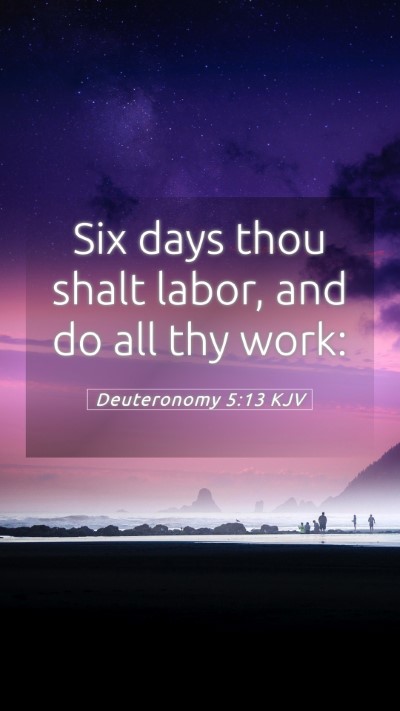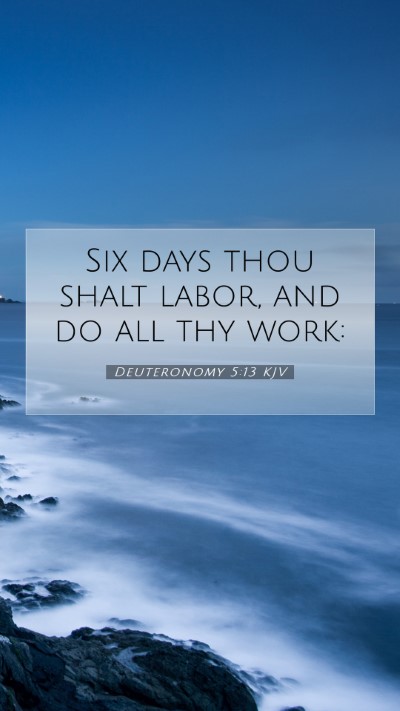Understanding Deuteronomy 5:13: A Comprehensive Bible Verse Commentary
Deuteronomy 5:13 states: "Six days you shall labor and do all your work." This verse forms part of the Ten Commandments and serves as a foundational principle in Judeo-Christian ethics concerning rest, work, and divine precept. In this commentary, we will explore the deeper meaning of this scripture using insights from respected public domain commentaries.
Verse Context and Background
To fully understand the meaning of Deuteronomy 5:13, one must first grasp the historical and cultural context in which it was delivered. The Israelites, having escaped slavery in Egypt, are being instructed on how to live as a free people under God’s covenant. This divine legislation emphasizes the importance of work balanced with rest, embodied in the Sabbath commandment.
Analysis of Deuteronomy 5:13
-
Matthew Henry's Commentary:
Matthew Henry breaks down the concept of work, asserting that labor is both a duty and a gift from God. He emphasizes the importance of dedicating six days to work, noting that hard work is a means of fulfilling one's purpose and contributing to society. The instruction to work encapsulates the value of diligence and the necessity of provision for oneself and one’s family.
-
Albert Barnes' Notes:
Albert Barnes elaborates on the theme of the Sabbath, contextualizing Deuteronomy 5:13 within the broader command to rest on the seventh day. He interprets labor not just as physical toil but also as a spiritual discipline that fosters a connection to God. He argues that work, when viewed through the lens of divine teaching, becomes an act of worship.
-
Adam Clarke’s Commentary:
Adam Clarke reflects on the significance of establishing a routine of work and rest. He emphasizes that the delineation between work days and the Sabbath serves not just as a communal regulation but as an individual spiritual practice that enhances one's relationship with God. Clarke sees an intrinsic link between the nature of God's creation and the rhythm of life that includes both labor and rest.
Theological Implications
Theological reflections on Deuteronomy 5:13 suggest that work is divinely instituted, aligning with God's creative order. This verse supports the theological understanding that while rest is essential, so too is the dedication to labor. The balance of work and rest reflects God's own example during creation, as established in Genesis.
Practical Applications
-
Application to Daily Life:
Individuals are encouraged to reflect on how they structure their week. This verse serves as a reminder that both work and rest are essential for physical and spiritual well-being. Properly observing a day of rest allows believers to recharge and focus on their relationship with God, promoting a holistic lifestyle.
-
Encouragement for Bible Study Groups:
This verse can be an excellent topic for Bible study groups examining the significance of work and the practice of Sabbath. Discussion can revolve around personal interpretations of labor in the light of faith and the importance of pausing to reassess life priorities through rest.
-
Online Bible Study Tools:
For those engaging in online Bible studies, resources can be used to delve deeper into the implications of labor and Sabbath across different biblical contexts, enhancing understanding of God's tenets.
Additional Bible Cross References
- Exodus 20:9-10: Similar instruction regarding work and rest.
- Genesis 2:2-3: God's example of resting after creation.
- Colossians 3:23-24: Work as a service to the Lord.
Conclusion
Deuteronomy 5:13 encapsulates a profound truth about the balance between work and rest. Understanding this verse in its scriptural, historical, and practical context facilitates a richer Bible verse interpretation. Whether one is exploring the meaning of Bible verses through personal study or engaging in Bible study lessons with a group, the insights provided by biblical commentators can deepen theological understanding and promote a lifestyle aligned with divine principles.


